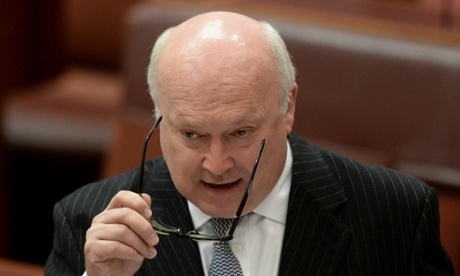George Brandis sparks heated debate by saying areas under negotiation should not be described in 'judgmental language'

The government on Thursday delivered a statement to clarify its stand on the controversial question of the legality of settlements after the issued flared up at a Senate hearing the night before.
The attorney general, George Brandis, on behalf of the minister for foreign affairs, Julie Bishop, said it was "unhelpful" to refer to historic events when describing these areas, given the ongoing Middle East peace process.
"The description of East Jerusalem as 'occupied' East Jerusalem is a term freighted with pejorative implications which is neither appropriate nor useful," Brandis told a Senate estimates hearing.
"It should not and will not be the practice of the Australian government to describe areas of negotiation in such judgmental language."
Brandis sparked a heated debate the previous evening when he stated that no Australian government of either political persuasion "acknowledges or accepts" the use of the word occupied.
A number of senators disagreed, pointing out that Australia had voted in support of UN resolutions in 2011 and 2012 where such language was used to describe the East Jerusalem settlements.
Independent senator Nick Xenophon, among other senators, suggested that dropping the term occupied would be a "massive shift" in Australia's foreign policy.
Xenophon tried unsuccessfully to determine whether the Department of Foreign Affairs and Trade had changed its legal advice to the government on settlements.
In line with protocol, the secretary of Dfat, Peter Varghese, did not discuss the department's legal advice before the Senate committee, but did concede the word "occupied" had been used by the government in the past.
Bishop raised eyebrows in January when she questioned which international law had declared Israeli settlements illegal.
The former foreign affairs minister Bob Carr was a vocal critic of settlements, which opponents cite as a key obstacle to a future Palestinian state and a lasting peace agreement with Israel.
No comments:
Post a Comment